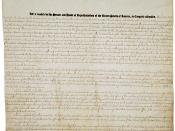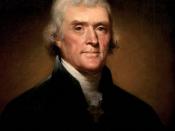The difference of opinion between Thomas Jefferson and Alexander Hamilton about the role of a national bank is primarily based in the differences in their views about politics and economics, and their interpretation of the Constitution. Jefferson and Hamilton were both fundamental in the creation of the Constitution and the present government. They both agreed that the government needed some changes, but that is where the similarities ended.
After the revolution, one of the main areas of government that needed changes was the economic system. The Articles of Confederation were created by a population with the memory of Parliament fresh in their heads. The weak central government they created did not have the power to tax, and the debt incurred by the revolution was unpaid. States coined their own money to counter the worthless national money, and would not trade with each other. Alexander Hamilton was chosen to try to fix the problem.
To solve the problem of debt, he proposed that the government consolidate all of the war debts into one government debt at a lower interest rate. Thomas Jefferson was from Virginia, and represented the farming class there. They opposed Hamilton's plan for the debt because some states such as Maryland, Virginia, and North Carolina did not want to help pay off the other states' debts when they had already paid off their own. They later agreed to the plan when Hamilton agreed to support the location of the capitol on the Potomac River, between two southern states. Hamilton's plan was such a big success that many European countries gained faith in the American economy, and began to invest capital.
Hamilton also wanted to create a national bank, similar to the one in Britain. It would collect taxes, hold government funds, and make loans. Jefferson and his supporters...


